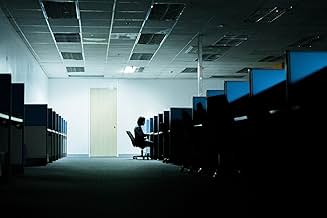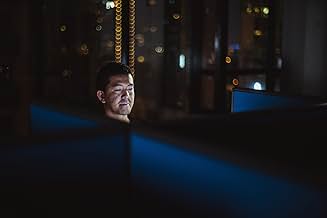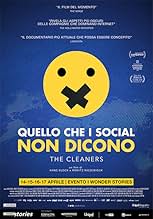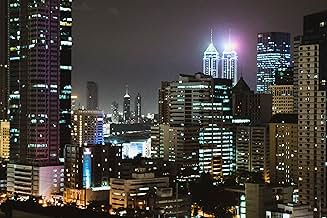Im Schatten der Netzwelt
- 2018
- 1 घं 28 मि
IMDb रेटिंग
7.1/10
1.9 हज़ार
आपकी रेटिंग
अपनी भाषा में प्लॉट जोड़ेंA look at the shadowy underworld of the Internet where questionable content is removed.A look at the shadowy underworld of the Internet where questionable content is removed.A look at the shadowy underworld of the Internet where questionable content is removed.
- निर्देशक
- लेखक
- स्टार
- पुरस्कार
- 8 जीत और कुल 10 नामांकन
Mark Zuckerberg
- Self
- (आर्काइव फ़ूटेज)
Donald Trump
- Self
- (आर्काइव फ़ूटेज)
फ़ीचर्ड समीक्षाएं
The issue presented is the readily fast deletion of information from social media. There are groups of paid cleaners (mostly outsourced) by the Corporate Internet; better known as Social Media. The deletion of facts through corporate policies, government silence, and the protection of family friendly optimism. In one instance being a photograph lacking content that is immediately erased because it shows harm to a child. The moral outrage of the image is that it doesn't belong on social media. The content shows it's an image outlining the government abuses in a country that doesn't have a voice to inform the rest of the world. It takes (maybe) all of 8 seconds to view & delete the image from Facebook. When you ask yourself, what's the best thing to do(?) Remove an image that could scare a young person or allow an image because it needs to be addressed?
'The Cleaners' provides examples of internet censorship and the harm it does to freedom. The current censorship in social media has become harshly political. Moderators with Google, Facebook, Twitter, Reddit, etc are free to enforce their own political opinions on a world that can & will disagree with them. Unfortunately the film shows it from the same perspective as a Democratic voter. So much of it points at the current Republican administration that how would a younger audience know it began with the Democratic administration? It draws a line rather than being bold enough to admit both parties are responsible for censorship on a scale as large as the internet.
'The Cleaners' provides examples of internet censorship and the harm it does to freedom. The current censorship in social media has become harshly political. Moderators with Google, Facebook, Twitter, Reddit, etc are free to enforce their own political opinions on a world that can & will disagree with them. Unfortunately the film shows it from the same perspective as a Democratic voter. So much of it points at the current Republican administration that how would a younger audience know it began with the Democratic administration? It draws a line rather than being bold enough to admit both parties are responsible for censorship on a scale as large as the internet.
Well made movie with an interesting topic. While i brought am insight in extremistic and violent content censorship it left out how US standars in erotic are applied to the rest of the world.
10marbez
It is terrible how internet companies and so called "social media" control our minds and ignore all the elected governments...
Being an IT-consultant myself, having worked in information security for many years already, the movie did not offer many new insights, for me that is. Nevertheless, I'm always interested in any serious attempt to get the negative aspects of Internet across. Yet it may shoot above the heads of the average end user, thus failing to reach the intended audience and probably also won't effectively work as an eye-opener.
An interesting approach is to revolve the story line around the so-called content moderators, to consistently return to one of them to delineate the respective sections of the documentary. Their jobs are not easy, for example 3% of their decisions are checked by their supervisor, and they can make only a few mistakes per month. On the other hand, they are paid very well relatively in terms of the usual salaries in that part of the world.
A continuous stream of violence and other hefty photos or video's, all bordering on what is tolerable, will have ultimate effects on these moderators, something that is rightly touched by the movie. Their jobs will have nasty side effects on their minds. Despite the short exposure times per photo (20 seconds??), the sheer volume and the high percentage of disturbing images is bound to leave long lasting effects. I assume some sort of PTSS, despite the moderator not being physically involved in the situations at hand. As a form of self-defense, he may maintain the position that what he sees is happening far away and not affecting him dangerously in a physical sense. Conversely, it may broaden their horizon and make them aware of things not common in their own country. For example, one of the moderators told she developed an interest in sex toys as a side effect of her job, being something completely new to her before.
There were a few relatively short scenes wherein general counsels of the most-involved companies (Google, Facebook and Twitter) were questioned in the US House/Senate. What we got to see seemed devoid of any real content, possibly merely added to demonstrate that these companies are closely watched by politicians. The trivial questions we saw put to them and their prepared responses, did not contribute to my feeling that they are really scrutinized by politicians. (Side note: In April 2018 Facebook's Mark Zuckerberg made an appearance in the US House/Senate, in the aftermath of the Cambridge Analytica revelations. His questioning left a similar impression of triviality.). We cannot blame the politicians, as their inability is inevitable due to a lack of understanding how Internet works. However, in a way it was still relevant to add these sessions, if only to let the companies quote some numbers about people involved in the "cleaning" process. One of them mentioned even 10,000 employees, leaving unclear whether this also included contractors outside the US, like the ones in Manilla who were the main topic of this documentary.
The documentary provided also for some insight in the mistakes these moderators can make, for example because of little knowledge of (slang) vocabulary, missing cultural context, different norms in other parts of the world, and so on. Best example is the iconic picture that had an important influential role in showing the US people the truth about the Vietnam war, but it contained a frontal nude minor, hence had to be removed according to the written rules. My personal fear is that the deletion process tends to err on the side of caution and thus become too careful, thereby removing important documents about e.g. political conflicts (some examples were mentioned, but this topic got too little attention). Also pointed out were contemporary trends that some countries put pressure on the "platforms" to remove content that is not friendly towards the acting government, thereby suppressing the opposition and disconnecting them from their audience. These platforms prove to be lenient, just to prevent being blocked altogether which would render their business (e.g. advertising) impossible, with a negative influence on their profit/loss figures and their stakeholder value.
Though one of the reviewers complained that a beheading was shown on screen that took too long and was too painful to watch, I did not see his/her issue (maybe that scene was deleted afterwards). What they showed instead was an already beheaded body with the severed head on top, thereby explaining some details about the way this victim was beheaded, given the marks on the skin (apparently a kitchen knife was used, which is far from painless).
An interesting approach is to revolve the story line around the so-called content moderators, to consistently return to one of them to delineate the respective sections of the documentary. Their jobs are not easy, for example 3% of their decisions are checked by their supervisor, and they can make only a few mistakes per month. On the other hand, they are paid very well relatively in terms of the usual salaries in that part of the world.
A continuous stream of violence and other hefty photos or video's, all bordering on what is tolerable, will have ultimate effects on these moderators, something that is rightly touched by the movie. Their jobs will have nasty side effects on their minds. Despite the short exposure times per photo (20 seconds??), the sheer volume and the high percentage of disturbing images is bound to leave long lasting effects. I assume some sort of PTSS, despite the moderator not being physically involved in the situations at hand. As a form of self-defense, he may maintain the position that what he sees is happening far away and not affecting him dangerously in a physical sense. Conversely, it may broaden their horizon and make them aware of things not common in their own country. For example, one of the moderators told she developed an interest in sex toys as a side effect of her job, being something completely new to her before.
There were a few relatively short scenes wherein general counsels of the most-involved companies (Google, Facebook and Twitter) were questioned in the US House/Senate. What we got to see seemed devoid of any real content, possibly merely added to demonstrate that these companies are closely watched by politicians. The trivial questions we saw put to them and their prepared responses, did not contribute to my feeling that they are really scrutinized by politicians. (Side note: In April 2018 Facebook's Mark Zuckerberg made an appearance in the US House/Senate, in the aftermath of the Cambridge Analytica revelations. His questioning left a similar impression of triviality.). We cannot blame the politicians, as their inability is inevitable due to a lack of understanding how Internet works. However, in a way it was still relevant to add these sessions, if only to let the companies quote some numbers about people involved in the "cleaning" process. One of them mentioned even 10,000 employees, leaving unclear whether this also included contractors outside the US, like the ones in Manilla who were the main topic of this documentary.
The documentary provided also for some insight in the mistakes these moderators can make, for example because of little knowledge of (slang) vocabulary, missing cultural context, different norms in other parts of the world, and so on. Best example is the iconic picture that had an important influential role in showing the US people the truth about the Vietnam war, but it contained a frontal nude minor, hence had to be removed according to the written rules. My personal fear is that the deletion process tends to err on the side of caution and thus become too careful, thereby removing important documents about e.g. political conflicts (some examples were mentioned, but this topic got too little attention). Also pointed out were contemporary trends that some countries put pressure on the "platforms" to remove content that is not friendly towards the acting government, thereby suppressing the opposition and disconnecting them from their audience. These platforms prove to be lenient, just to prevent being blocked altogether which would render their business (e.g. advertising) impossible, with a negative influence on their profit/loss figures and their stakeholder value.
Though one of the reviewers complained that a beheading was shown on screen that took too long and was too painful to watch, I did not see his/her issue (maybe that scene was deleted afterwards). What they showed instead was an already beheaded body with the severed head on top, thereby explaining some details about the way this victim was beheaded, given the marks on the skin (apparently a kitchen knife was used, which is far from painless).
Documentary focusing on content moderators for social media working out of Manila, Philippines. Really manages to connect the dots between Silicon Valley's breezy disregard for social responsibility and many atrocities going on in the world. A real eye opener, drives home how the outsourcing of editorial policy to grossly unqualified and underpaid people has put all of us at risk. The directors manage to accomplish this with little or no editorializing. Just great interviews and effective editing. Hard-hitting, old-school documentary on a chilling topic. I would give it a 10, except for minor quibbles about filmmaking decisions (mostly music and soundtrack). Still, not to be missed. Gripping from start to finish.
क्या आपको पता है
- भाव
Donald Trump: If I wouldn't have social media, I couldn't get the word out. I probably wouldn't be standing here, right?
टॉप पसंद
रेटिंग देने के लिए साइन-इन करें और वैयक्तिकृत सुझावों के लिए वॉचलिस्ट करें
- How long is The Cleaners?Alexa द्वारा संचालित
विवरण
- रिलीज़ की तारीख़
- कंट्री ऑफ़ ओरिजिन
- आधिकारिक साइटें
- भाषा
- इस रूप में भी जाना जाता है
- The Cleaners
- फ़िल्माने की जगहें
- उत्पादन कंपनियां
- IMDbPro पर और कंपनी क्रेडिट देखें
बॉक्स ऑफ़िस
- दुनिया भर में सकल
- $43,670
- चलने की अवधि1 घंटा 28 मिनट
- रंग
इस पेज में योगदान दें
किसी बदलाव का सुझाव दें या अनुपलब्ध कॉन्टेंट जोड़ें


























